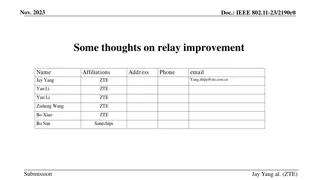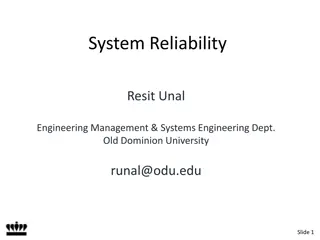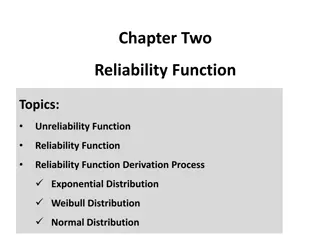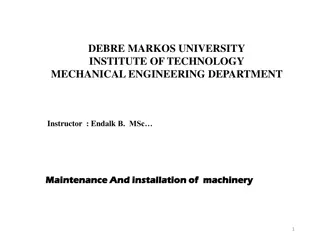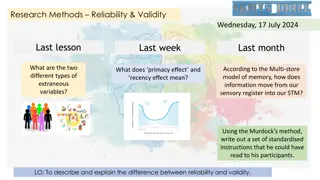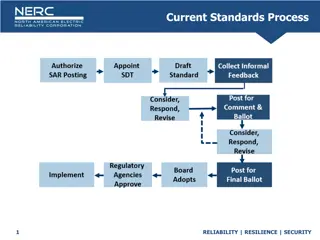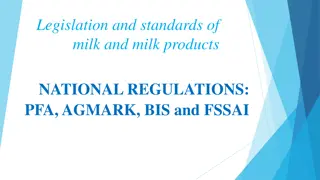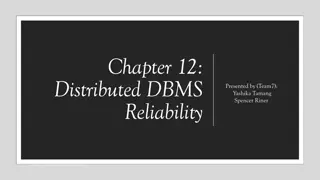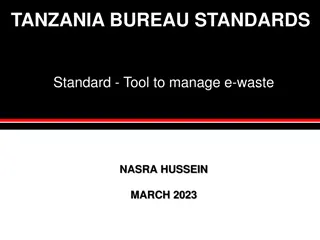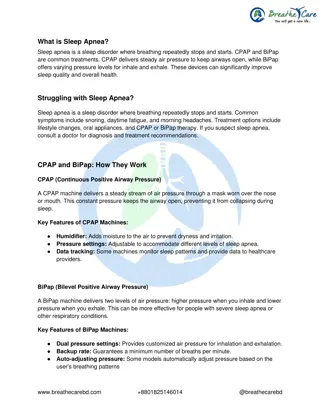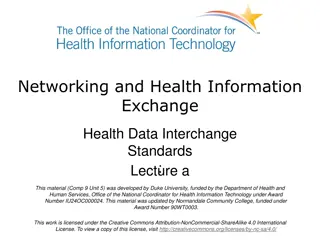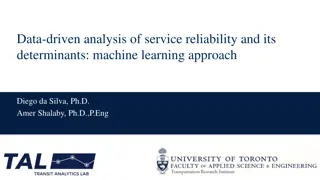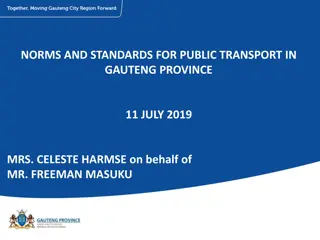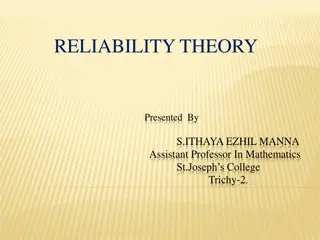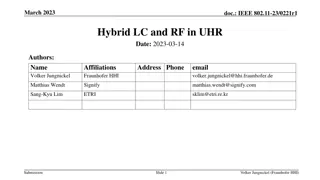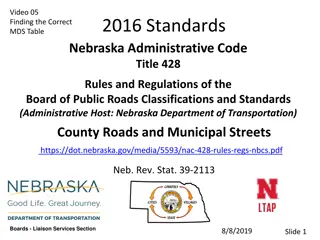DRRS Design to Meet HB1500 Intent
The primary goal of the DRRS in line with HB1500 is to determine the quantity of services required based on historical variations in generation availability to uphold targeted reliability standards. The system must be able to shed firm load during extreme events, particularly severe winter storms, a
0 views • 6 slides
Functional Safety and Cyber Security International Standards Update
This update covers various international standards related to functional safety and cyber security, including protocols like CSMA/CD, CSMA/CA, TSN, as well as standards for safety engineering tools and safety modules. It also highlights the collaboration with BSI standards for developing industry st
2 views • 16 slides
Software Engineering and Architecture
Reliability in software systems is crucial, as defects can lead to failures impacting reliability. The number of defects directly affects the system's reliability. Not all defects are equal, so prioritizing defect correction based on return on investment is essential. Testing thoroughly, especially
1 views • 40 slides
Enhancing Wi-Fi Relay Networks for Improved Coverage and Reliability
This document discusses the need to enhance relay frameworks in Wi-Fi networks to improve coverage, reliability, and performance of stations in different ranges. It highlights the challenges of S1G-based relays, proposes enhancements to the relay framework, and introduces new types of relay framewor
1 views • 12 slides
Understanding Software Reliability Metrics
Software reliability is a vital aspect of system quality, ensuring that systems behave as expected and operate without frequent failures. Key concepts include fault, failure, and different time intervals like MTTF, MTTR, and MTBF. By measuring and understanding these metrics, we can assess the relia
1 views • 21 slides
Overview of Internal Audit Standards and Accounting Standards
This content provides an overview of internal audit standards and accounting standards, emphasizing the importance of continuous professional development and updating in the field. It covers various accounting standards, including disclosures, valuation, revenue recognition, and more. Additionally,
5 views • 43 slides
Overview of Human Factors and Automotive Standards YouTube Series
This YouTube series, led by Paul Green from the University of Michigan, covers human factors and automotive standards. It includes topics like introduction to standards, core human factors standards, automotive human factors standards, human-computer interaction standards, and SAE vehicle standards.
7 views • 9 slides
Energy Supply Analysis Working Group Updates and Studies
The Supply Analysis Working Group (SAWG) provided updates on various studies including reliability standards, Value of Lost Load (VOLL) study, and Cost of New Entry (CONE) study. The SAWG agenda for October covered important topics like reliability standards, VOLL surveys, and more. The group is act
3 views • 7 slides
DRRS Design to Meet HB1500 Intent
DRRS design aims to meet the requirements of HB1500 in determining the quantity of services needed for reliability standards in ERCOT grid operations. The primary goal is to ensure operational reliability during extreme events with a focus on dispatchable generation facilities. DRRS resources must b
0 views • 6 slides
Site Reliability Engineering Online Training | Hyderabad
Visualpath offers an effective Site Reliability Engineering Online Training Program. To schedule a free demo, simply reach out to us at 91-9989971070.\nVisit \/\/ \/site-reliability-engineering-sre-online-training-hyderabad.html\nWhatsApp: \/\/ \/catalog\/919989971070\/\n
0 views • 9 slides
Understanding System Reliability in Engineering
System Reliability in Science/Engineering involves understanding how products/systems work, as well as the ways they fail and the effects of failures. Reliability is the probability that a system will perform as expected under given conditions and play a crucial role in the design phase to mitigate
0 views • 19 slides
Understanding Reliability Functions in Data Analysis
Reliability functions play a crucial role in data analysis, providing insights into the probability of success or failure over time. This chapter delves into topics like unreliability functions, derivation processes for reliability functions using distributions like exponential, Weibull, and normal.
0 views • 19 slides
Understanding Reliability in Mechanical Engineering
Reliability in mechanical engineering pertains to the ability of a product to perform as expected over a specified period under defined operational conditions. This article delves into the factors influencing reliability, such as numerical value, intended function, product life, and operating condit
0 views • 61 slides
Understanding Research Methods: Reliability and Validity in Psychological Studies
In psychological research, understanding reliability and validity is crucial. Reliability refers to consistency in measurements, while validity focuses on whether the results accurately represent the phenomenon being studied. Ensuring both reliability and validity enhances the credibility of researc
0 views • 13 slides
Current Standards Process for Reliability, Resilience, and Security
The current standards process focuses on ensuring reliability, resilience, and security in regulatory directives. It involves remanding standards to committees, convening technical conferences, re-ballingoting within 45 days, and considering input for further work. The process also covers the initia
1 views • 8 slides
Day-Ahead Ancillary Services Initiative Overview
The Day-Ahead Ancillary Services Initiative (DASI) aims to procure and transparently price ancillary services to ensure a reliable operating plan in the Day-Ahead Energy Market. With DASI, the ISO seeks to meet key day-ahead reliability requirements within the clearing of the day-ahead market, elimi
0 views • 59 slides
Milk and Milk Products: Regulations and Standards in India
The regulations and standards for milk and milk products in India are governed by national bodies such as PFA, AGMARK, BIS, and FSSAI. Legal standards set by the government ensure minimum requirements for quality, composition, hygiene, labeling, and packaging. Quality standards, like BIS and Agmark,
2 views • 36 slides
Distributed DBMS Reliability Overview
This chapter delves into the critical aspect of reliability in distributed database management systems (DBMS). It explores the concepts, measures, types of faults, and the significance of maintaining atomicity and durability properties of transactions in ensuring system reliability. The narrative hi
0 views • 51 slides
Evolution of Structural Standards for Antenna Towers and Supporting Structures
The history of TIA-222 and its development through various industry groups led to the establishment of structural standards for steel antenna towers and supporting structures. Starting from TR-116 in 1949 to the latest ANSI/TIA-222-H in 2017, these published standards have evolved to ensure safety a
0 views • 19 slides
Tanzania Bureau of Standards: Managing E-Waste with Standards
Tanzania Bureau of Standards (TBS), established in 1975, plays a vital role in formulating and implementing national standards, including those for managing e-waste. Standards ensure quality, safety, and sustainability in materials, products, and services. TBS follows international best practices in
0 views • 22 slides
IEEE Vehicular Technology Society Standards Update
The Vehicular Technology Society (VTS) and its standards committees, in collaboration with ITU-T, are focused on communication standards for automated vehicles. This update covers approved scopes and new project authorization requests related to extending functionality and ensuring security in vehic
8 views • 12 slides
Optimized Standards for Medical Device Safety and Performance in the EU
This report discusses the importance of harmonized standards in supporting the safety and performance of medical devices in the EU. It highlights the impact of drafting international medical device standards on EU legislation harmonization and emphasizes the role of harmonized standards under the EU
0 views • 8 slides
ANSI C12.1 Overview and Current Events
ANSI C12.1 standards are integral to the electric metering industry. The standards, managed by the American National Standards Institute (ANSI) and NEMA, promote voluntary compliance. NEMA plays a crucial role as the secretariat, overseeing committees that propose and review standards every five yea
0 views • 32 slides
Elevating Healthcare Standards with Premier Solutions and Unmatched Reliability
Elevating Healthcare Standards with Premier Solutions and Unmatched Reliability
1 views • 2 slides
NUSSC 57th Meeting - End of Term Report & Safety Standards Update
The 57th Meeting of the Nuclear Safety Standards Committee (NUSSC) concluded its 9th term with significant achievements including the approval and publication of multiple safety standards. Key highlights include the development of new standards such as SSG-3, SSG-88, SSG-89, and SSG-90 focusing on v
0 views • 8 slides
NERC Operating Committee Update & Strategic Plan Overview
The NERC Operating Committee (OC) oversees critical operational reliability matters within the electricity sector, aligning with the organization's strategic plan for the next five years. Led by Chair Jim Case and Vice-chair Lloyd Linke, the OC collaborates with various stakeholders, focusing on eme
0 views • 15 slides
Role of Statistical Standards in Building National Data Backbones
The role of statistical standards in constructing national data backbones is crucial for efficient data dissemination and reporting, especially in the context of Sustainable Development Goals (SDGs). Statistical standards guide the orchestration of information flows within a national statistical net
0 views • 22 slides
Development of Harmonized North American Life Jacket Standards
The development of harmonized North American life jacket standards led by Brandi Baldwin in the Lifesaving & Fire Safety Division at the Office of Design & Engineering Standards is a crucial regulatory process. It involves regulatory progress, standards development, consensus processes, and ongoing
0 views • 16 slides
Enhancing Reliability, Resilience, and Security in Electrical Infrastructure
The project outlines modifications to NERC standards FAC-001 and FAC-002 aimed at improving reliability, resilience, and security in the electrical sector. Key agenda items include administrative reviews, antitrust compliance guidelines, and public disclaimers. The focus is on clarifying responsibil
0 views • 14 slides
AI-Based Compression and Understanding of Industrial Data (MPAI-CUI) - Company Performance Prediction Use Case
AI-based Compression and Understanding of Industrial Data (MPAI-CUI) is a standard developed by the MPEG standards group. This standard focuses on transforming data into a more suitable format for applications. The presentation will cover the introduction to MPAI, applications, a demo for anonymous
0 views • 25 slides
IEEE 2018 Emerging Technologies Reliability Roundtable Summary
The IEEE 2018 Emerging Technologies Reliability Roundtable took place in Austin, Texas, featuring speakers from various technology companies discussing topics such as software reliability, 5G network challenges, and ultra-reliability in wireless communication. The agenda included insightful talks, Q
0 views • 11 slides
Health Data Interchange Standards Overview
Explore the importance of data standards in healthcare, including HL7 standards, core requirements for data exchange, and choices for data interchange. Learn about HL7 v2 and v3 messaging standards, document standards, and the benefits of using HL7 v2 messaging standard. Understand why data intercha
0 views • 28 slides
ACE RAM Workshop - Barcelona 2019: Reliability and Maintenance Concepts
The ACE RAM Workshop conducted by George Pruteanu in Barcelona focused on topics such as RAM prediction, FMEA, maintenance concepts, preventive and predictive maintenance, condition monitoring systems, corrective maintenance, and design for maintenance. The workshop delved into reliability predictio
0 views • 16 slides
Machine Learning Approach for Analyzing Service Reliability Factors in São Paulo Transit Data
Explore how machine learning methods are applied to analyze São Paulo transit data, focusing on factors affecting bus service reliability measures. The study delves into quantifying and identifying relevant factors impacting service reliability across different levels such as stops, routes, and the
0 views • 10 slides
Norms and Standards for Public Transport in Gauteng Province - July 2019
This document outlines the norms and standards for public transport in Gauteng Province as of July 2019, covering aspects such as service quality, availability, convenience, comfort, reliability, and more. It addresses the importance of service reliability and its impact on passenger demand, operati
0 views • 21 slides
Understanding Reliability Theory in Engineering and Mathematics
Reliability theory, presented by S. Ithaya Ezhil Manna, explains the concept of reliability as the probability of a component functioning properly over time. The theory defines reliability in terms of the random variable X representing component life or time to failure. Key points include the defini
0 views • 22 slides
Integration of Light Communications for Enhanced Reliability in Multilink Operations
The presentation discusses the integration of Light Communications (LC) into the Multilink Operation (MLO) framework to enhance reliability and reduce latency in wireless communications. By proposing the incorporation of LC as a new offloading opportunity within the MLO framework, the potential for
0 views • 15 slides
Understanding Nebraska's Road Design Standards
Explore the Nebraska Administrative Code Title 428, which outlines the standards and regulations for public roads in Nebraska, including county roads and municipal streets. Learn about terminology, acronyms, and design tables to find the appropriate standards for road and street work. Discover the p
0 views • 51 slides
Understanding Reliability Measures in Research Supervised by Dr. Mohammed Mahdi Sharifi
Reliability is crucial for assessing the consistency of metrics in research. Various methods such as inter-rater reliability, test-retest reliability, parallel forms reliability, and internal consistency reliability help ensure the dependability of research findings. By examining factors like judgme
0 views • 9 slides
EHFA Standards in the Fitness Industry
The EHFA Standards Council has developed a series of standards for fitness occupations, focusing on job purpose as the foundation for qualifications. EHFA provides guidance on standards for people, programs, and places in the health and fitness sector. Since 2003, EHFA has been setting standards for
0 views • 19 slides



